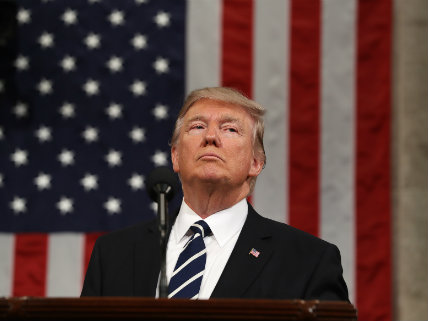Trump Says He Wants to Stop Drugs Flowing Over the Border. Marijuana Legalization Would Do That
Drugs aren't coming in from Mexico at an unprecedented rate, thanks to legalization in a handful of states.

If Donald Trump wants to stop the flow of drugs into the United States from Mexico—as he said he did during his address to a joint session of Congress on Tuesday night—then there is one proven way to do it: let more states legalize marijuana.
That's not what Trump proposed, of course. His supposed solutions are all about building walls, growing the power of the federal government's drug enforcement arms, and continuing a failed policy of prohibition.
"We will stop the drugs from pouring into our country and poisoning our youth," Trump said. He later claimed that our current un-walled borders allow "drugs to pour in at a now unprecedented rate."
Except, no. Drugs aren't pouring into the country at an unprecedented rate (neither, too, are immigrants, but that's another story). In fact, border agents are reporting that flow of drugs has been slowed, even reversed, by the legalization of marijuana in a handful of American states.
The Washington Post reported last year that "marijuana seizures along the southwest border tumbled to their lowest level in at least a decade."
"Agents snagged roughly 1.5 million pounds of marijuana at the border, down from a peak of nearly 4 million pounds in 2009," the Post reported. "The DEA has even found evidence that the flow of illegal marijuana is starting to reverse, with some cases of U.S. marijuana being smuggled into Mexico."
A marijuana grower in Mexico described a similar economic phenomenon in December 2014 to NPR News, and blamed the legalization of marijuana in some parts of the United States.
"Two or three years ago, a kilogram of marijuana was worth $60 to $90," the anonymous grower told NPR. "Now they're paying us $30 to $40 a kilo. It's a big difference. If the U.S. continues to legalize pot, they'll run us into the ground."
Trump's plans to funnel more money into the War on Drugs, and perhaps even to crack down on states where marijuana has been legalized, are a gift to the drug cartels, which benefit from higher prices created by prohibition in the United States.
"It's important to understand that the Drug War created the cartels, not the other way around," David Bienenstock, the head of content at High Times and a reporter with 15 years of experience covering marijuana markets and the federal government's war on those markets, told me in an interview last month. "We've been wasting trillions of dollars for nearly 50 years on wholly ineffective, and even counterproductive, efforts to stop the flow of drugs into the United States, and those efforts have only made the cartels bigger, stronger, and more dangerous.
Trump should know that. "You have to legalize drugs to win that war," Trump said at a luncheon hosted by the Miami Herald in 1990. "You have to take the profit away from these drug czars."
Failing to understand—or perhaps failing to remember—how the economics of the drug trade work is another example of how Trump's economic policy is setting the country up to fail. His address on Tuesday night was the most "presidential" moment of his brief time in office, but it might have accomplished little more than normalizing policy ideas that will reverse the limited progress achieved by some states on ending drug prohibition, leaving Americans less free and drug cartels more powerful than ever.
